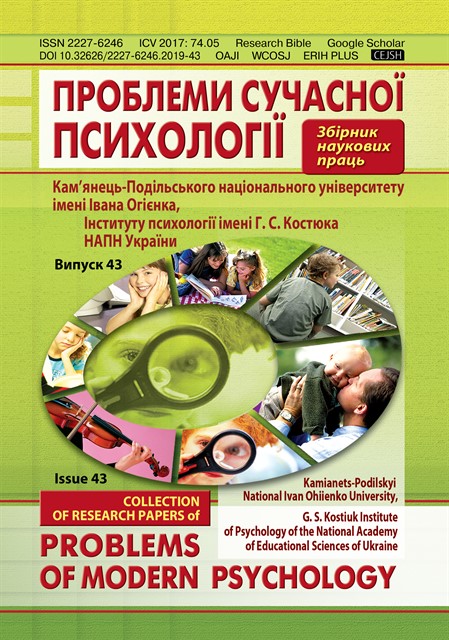Стратегія реконструювання як мисленнєвий механізм розв’язування творчої математичної задачі
DOI:
https://doi.org/10.32626/2227-6246.2019-43.147-166Ключові слова:
творче математичне мислення, розуміння, прогнозування, апробація, реконструювання, мисленнєва тенденція, мисленнєва стратегія.Анотація
У статті розглянуто питання стосовно психологічної сутності дії
мисленнєвої стратегії реконструювання як механізму розв’язування
творчої математичної задачі.
За результатами досліджень математичного мислення конста-
товано його творчий характер та означено підхід до його вивчення
шляхом аналізу переважаючих мисленнєвих дій у процесі розв’язування
творчих математичних задач різних класів: на знаходження невідомої
величини, на доведення, на побудову, евристичних задач. Виокремлено
три складові процеси творчого математичного мислення: процес ро-
зуміння, процес прогнозування та апробаційний процес.
В експерименті взяли участь 220 студентів технічного універси-
тету. Встановлено, що реконструюючі дії епізодично зустрічаються
впродовж усіх складових процесів творчого математичного мислення
студентів, і проведено аналіз реконструювання у зазначених процесах
упродовж розв’язування всіх класів математичних задач.
З’ясовано, що у деяких випадках мисленнєві дії реконструювання
набувають стану мисленнєвої тенденції і можуть мати місце або
впродовж будь-якого складового процесу, або кількох процесів, пере-
творюючись у переважаючі мисленнєві тенденції і призводячи до ре-
зультативності пошукового процесу. Встановлено, що результатив-
ність реконструювання у процесах розуміння, прогнозування чи апро-
баційного процесу різна і може призвести як до вірного результату,
так і до хибного.
Акцентовано на значущості суб’єктивної впевненості у якості
отриманого результату, в можливості продовження мисленнєвих дій
із застосуванням реконструювання, у завершенні формування страте-
гії реконструювання.
Доведено, що у випадку, коли тенденція до реконструювання пере-
важає впродовж усіх складових процесів і суб’єкт отримує суб’єктивну
впевненість у правильності своїх дій, то така тенденція перетворю-
ється у мисленнєву стратегію реконструювання, яка забезпечує по-
зитивний результат пошукового мисленнєвого процесу, спрямованого
на розв’язування творчої математичної задачі.
Установлено, що мисленнєва стратегія реконструювання не на-
лежить до певного класу задач.
Посилання
Gurova, L. L. (1986). Processy ponimanija v razvitii myshlenija [Processes of understanding in the development of thinking]. Voprosy psihologii – Questions of Psychology, 2, 126–137 [in Russian].
Klajn, M. (1988). Matematika. Poisk istiny [Mathematics. Search for truth]. Moskwa : Mir [in Russian].
Kornilova, T. V. (1985). O tipah intellektual’nyh strategij prinjatija reshenij [About types of intelligent decision-making strategies]. Vestnik Moskovskogo un-ta – Newsletter of Moscow university, Series XIV: Psychology, 3, 11–24. Retrieved from http://www.msupsyj.ru/ [in Russian].
Moiseienko, L. A. (2003). Psykholohiia tvorchoho matematychnoho myslennia [Psychology of creative mathematical thinking]. Ivano-Frankivsk : Fakel [in Ukrainian].
Moiseienko, L. A. (2008). Stratehii tvorchoho myslennia studentiv tekhnichnoho VNZ [Strategies of creative thinking of technical institute’s students]. Stratehii tvorchoi diialnosti: shkola V. O. Moliako – Strategies of creative activity: school of V. O. Moliako. Kyiv : Osvita Ukrainy [in Ukrainian].
Moiseienko, L. A. (2018). Transformaciia strategii tvorchoho matematychnoho myslennia [Transformation of strategies of creative mathematical thought]. Aktualni problemy psykholohii osobystosti ta mizhosobystisnykh vzaiemyn: Tezy dopovidei X Mizhnarodnoi naukovopraktychnoi konferencii – The Tenth International Scientific and Practical Conference «Urgent issues of psychology of personality and interpersonal mutual relations». Kamianets-Podilskyi : Aksioma [in Ukrainian].
Moljako, V. A. (2007). Tvorcheskaja konstruktologija (prolegomeny) [Creative Constructology (prolegomen)]. Kiev : Osvita Ukrainy [in Russian].
Morduhaj-Boltovskij, D. D. (1998). Filosofija. Psihologija. Matematika: monografija [Philosophy. Psychology. Maths]. Moskwa : Serebrjanye niti [in Russian].
Jaleel, S., & Titus, B. (2015). Effectiveness of Gaming Strategy on Mathematical Creativity of Students at Secondary Level. Indian Journal of Applied Research, 5 (10), 243–245.
Schoenfeld, A. H. (1985). Mathematical problem solving. New York : Academia Press. Retrieved from https://doi:10.15373/2249555X.
Yaftian, N. (2015). The outlook of the Mathematicians’ Creative Processes. Procedia – Social and Behavioural Sciences, 191, 2515–2519. Retrieved from https://www.journals.elsevier.com/procedia-social-andbehavioral-sciences/special-issues.
##submission.downloads##
Опубліковано
Як цитувати
Номер
Розділ
Ліцензія
Редакція має повне право публікувати у Збірнику оригінальні наукові статті як результати теоретичних і експериментальних досліджень, які не знаходяться на розгляді для опублікування в інших виданнях. Автор передає редколегії Збірника права на розповсюдження електронної версії статті, а також електронної версії англомовного перекладу статті (для статей українською та російською мовою) через будь-які електронні засоби (розміщення на офіційному web-сайті Збірника, в електронних базах даних, репозитаріях та ін).
Автор публікації зберігає за собою право без узгодження з редколегією та засновниками використовувати матеріали статті: а) частково чи повністю в освітніх цілях; б) для написання власних дисертацій; в) для підготовки абстрактів, доповідей конференцій та презентацій.
Автор публікації має право розміщувати електронні копії статті (у тому числі кінцеву електронну версію, завантажену з офіційного web-сайту Збірника) на:
- персональних web-ресурсах усіх Авторів (web-сайти, web-сторінки, блоги тощо);
- web-ресурсах установ, де працюють Автори (включно з електронними інституційними репозитаріями);
- некомерційних web-ресурсах відкритого доступу (наприклад, arXiv.org).
Але в усіх випадках обов’язковою є наявність бібліографічного посилання на статтю або гіперпосилання на її електронну копію, що містяться на офіційному сайті Збірника.






